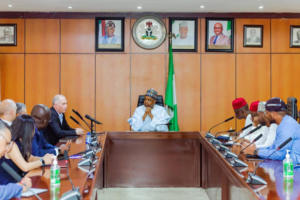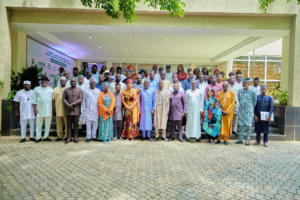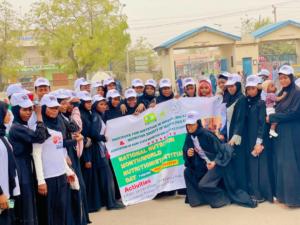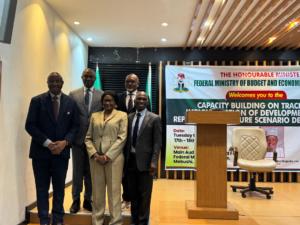The Economic Growth Department has the responsibility of promoting the country’s economic growth through identification of the growth drivers and enablers. In collaboration with relevant Ministries, Department and Agencies (MDAs), the Department engages in activities that enhance the growth and development of the Nigerian economy. To sustain the rate of growth in the economy, the Department seeks and harvest low hanging fruits, identify obstacles to the economic growth and proffer necessary solutions to address them. It also works with other critical stakeholders such as the Organized Private Sector (OPS), Civil Society Organizations (CSOs), Development Partners (DPs), the Academia, etc. to ensure a more coordinated and sustainable approach towards stimulating the economy.
Vision: To be a catalyst for inclusive, resilient, and sustainable economic growth that transforms Nigeria into a globally competitive and diversified economy, driven by innovation, private sector participation, and equitable opportunities for all citizens.
Mission: To formulate, coordinate, and implement policies and programmes for the real sector MDAs/Operators that stimulate inclusive growth, enhance productivity across sectors, promote investment and job creation, and ensure sustainable national development in alignment with Nigeria’s long-term development goals and aspirations.
MANDATES: Mandate of the Departments are as follows:
- Undertake the formulation of sectoral policies and programmes aimed at ensuring inclusive growth of the Nigerian Economy;
- Drafting Coordination of the relevant sectoral chapters of any Development plan e.g. (ERGP, Vision 2020, National Development Plan 2021 – 2025 and Nigeria Agenda 2050);
- Production of Half Year and Annual Performance Sectoral Reports for the Nigerian economy;
- Periodic review and appraisal of policies, programmes and projects in the relevant sectors of the economy;
- Set Sector Priorities (policies, programmes and projects) in collaboration with relevant MDAs that drive the real sector;
- Undertake Monitoring and Evaluation of relevant Sector Projects and Programmes in the economy in collaboration with the National Monitoring and Evaluation Department;
- Conduct researches on topical issues within the ambit of Productive Sector; and
- Provide technical guidance to Ministries, Departments and Agencies (MDAs) in development of Sector Plans and Programmes to ensure its alignment with the National Development Plan (NDP);
- Provide oversight functions on cross-cutting issues as may be required.
- To strengthen linkages between key sectors of the economy.
STRUCTURE OF THE DEPARTMENT
The Department is currently structured into three Divisions, namely:
[1] Agriculture and Water Resources;
[11] Natural Resources and Steel Development; and
[111] Industry, Trade, Investment and Services.
These Divisions are further broken down into Units Sections as follows:
A. Agriculture & Water Resources Division
Fishery & Livestock
- Fishery
- Livestock
Crop Production, Rural Dev. and Water Resources
- Crop Production.
- Rural Development & Extension Services.
- Water Resources.
B. Natural Resources & Steel Development Division
- Solid Mineral Development / Steel Development.
- Oil & Gas/Energy/Alternative Energy.
- Science and Technology Development
- Industry, Trade, Investment and Services Division
[i] Manufacturing and Industry. [ii] Investment and Trade.
[iii]] Entertainment, Culture, Tourism, Hospitality, Creative Economy.
[iv] Financial Services.
AGRICULTURE AND WATER RESOURCES DIVISION
The Agriculture and Food Security/Water Resources Division activities are centered on coordination of policies and programmes in the Agriculture and Water Resources sectors. In discharging its responsibilities, the Division among others, coordinates inputs from the Federal Ministry of Agriculture and Food Security (FMAFS) and the Federal Ministry of Water Resources & sanitation (FMWRS) including their parastatals into the National Development Plans and Budgetary process. It also highlights policy, related to topical issues that would affect productivity in the sectors. The Division has been actively involved in the development and implementation of the Agricultural Transformation Agenda (ATA) and the Agricultural Promotion Policy (2016 – 2020) produced by FMAFS to drive the Agriculture sector. The Division is also involved in interventions within policy and programme coordination of the Water Resources sector in areas such as hydrology and hydrogeology, water supply, irrigation, dams and flood control as well as soil erosion. The Division is currently driving the Cassava Bio-ethanol Value Chain Development Project to boost food production, accelerate growth rate of the economy through job creation and poverty reduction.
Agencies under the purview of the Division are listed below:
- Federal Ministry of Agriculture and Food Security and its Agencies.
- Federal Ministry of Water Resources.
- Federal Ministry of Livestock Development.
NATURAL RESOURCES AND STEEL DEVELOPMENT DIVISION
In discharging its responsibilities, the Division among others, coordinates inputs from the Ministry of Petroleum Resources (MPR), Ministry of Solid Minerals Development (MSMD), Ministry of Steel Development (MSD), Federal Ministry of Science and Technology (FMST), Ministry of Blue Economy, Ministry of Environment and their agencies. The Oil and Gas Unit of the Division coordinates activities in the petroleum exploration and exploitation in the country as well as harnessing of the gas resources. It also undertakes activities related to the Clean Development Mechanism (CDM) as its affects the energy sector in the country. The Oil and Gas Unit also coordinates Government policies and activities in the Oil and Gas sector which include Liquidities Natural Gas (LNG) and Natural Gas as well as up-stream and down-stream activities in the extractive industry. The Unit was actively involved in the development of the Nigeria Gas Policy produced by the Ministry of Petroleum Resources (MPR) to drive the gas sector.
The Solid Minerals Development Unit of the Division convened a Steel Sector Stakeholders Meeting to chart the course for the revitalization and development of the Nigeria’s steel sector. Likewise, the Science and Technology Unit of the Division coordinates activities in the Science, Technology and Innovation sectors of the economy to ensure that their policies, projects and programmes align with the set objectives of the National Development Plan (NDP) 2021 – 2025. The Unit also gathers and analyzes relevant data from Federal Ministry of Science and Technology and its parastatals for effective planning.
The Division has developed a draft National Bio-economy Strategy Framework for Nigeria to coordinate the effective utilization of the huge Bio-resources of the nation for the diversification of the Nigerian economy. The Bio-economy strategy is a game changer that will rejig the economy of the nation and increase GDP growth rate significantly.
Bio-economy involves the utilization, production and conservation of biological resources to provide sustainable solutions that enable a transformation to a sustainable economy that falls within the rubric of the Bio-economy strategy. The priority will be the use of the Bio-resources to accelerate the pace of economic growth and broaden the productive, technological, export and revenue bases.
The Division has developed a draft National Hydrogen Economy Strategy in collaboration with GIZ to further ease the diversification of the Nigerian economy.
INDUSTRY AND SERVICE DIVISION
The mandate of the Division revolves around the coordination of the overall Policy objectives of Government in Manufacturing and Industry, Trade & Investment, Financial Services, Culture, Art & Entertainment Industry, Communication and Micro, Small and Medium Enterprises as well as Economic Empowerment and Inclusive Planning. The Manufacturing Sector, which encompasses Industries, export promotion, and financial inter-mediation among others. The Division engages in the development of strategies to make Nigeria a hub for trade and investment in Africa and globally. It is also responsible for strengthening linkages between the key sectors of the economy. The Division works in collaboration with the relevant Ministries to develop policies and programmes that are congruence with the goals of the NDP (2021 – 2025) and national priorities. It is also responsible for ensuring that all cross-cutting economic variables and potentials are reflecting in the National agenda (I.e. MSMEs and Gender).
A Major Division’s deliverable includes facilitating economic direction of the country through periodic assessment and review of the performance of Nigerian economy to track current macroeconomic development.
Furthermore, the Division coordinates and liaises with relevant Federal and States MDAs, Organized Private Sector (OPS), MSMEs, Development Partners and other Stakeholders involved in achieving the priority programmes and projects as contained in NDP and other National Plans, these include the following:
- Development of the Domestic Market: To ensure that trade facilitates the development of Nigeria’s huge population into a positive economic force, in order to deepen intra/inter State trade and boost the contribution of trade to national GDP;
- Export Diversification: To ensure that trade facilitates the diversification of Nigeria’s export base, to lessen dependency on oil and gas;
- Industrialization: To ensure that trade supports Nigeria’s plans for an industrial revolution and enhances the nation’s productive capacity based on value addition, in order to improve the manufacturing sector’s contribution to GDP and to create jobs for teeming Nigerian youth;
- Market Access: To ensure that expanded market access promotes trade in both traditional and non-traditional markets for Nigerian products and services;
- Promotion of ‘Made-in-Nigeria’ Goods: To ensure that trade facilitates increased patronage of Made-in-Nigeria products;
- Employment Generation: To ensure that trade drives job creation in Nigeria;
- Promotion of Micro, Small, and Medium Enterprises (MSMEs): To ensure that trade facilitates the growth of MSMEs through improved access to regional and international markets;
- Creation of an Environment Conducive for Business: To ensure that the business environment facilitates trade, so as to encourage the development of Nigerian companies engaged in the production of high value-added products for domestic and export markets;
- Sustainable Development: To ensure that trade promotes environmental protection and poverty alleviation for sustainable economic growth and development; and
- Consumer Protection: To ensure that traded products meet consumer safety requirements and conform to competition policy expectations.
- Services: Advisory service to the Federal Ministries of Information, Culture & Tourism and National Orientation on the following:
- Innovation: To ensure that made in Nigeria goods and service confirm with international market requirements using world class innovations.
PAPERS & PUBLICATIONS
- The Nigerian Business Climate
- Toward Improved fertilizer Subsidy program in Nigeria
- National Policy on Food and Nutrition Document
- Paper on The Gulf of Guinea: The Nigerian Gas Master Plan and Opportunities for the Development of Gas Infrastructure
- Presentation on The Gulf of Guinea: The Nigerian Gas Master Plan and Opportunities for the Development of Gas Infrastructure
The Department is headed by Mr Auwal Saleehu Mohammed as the Director





